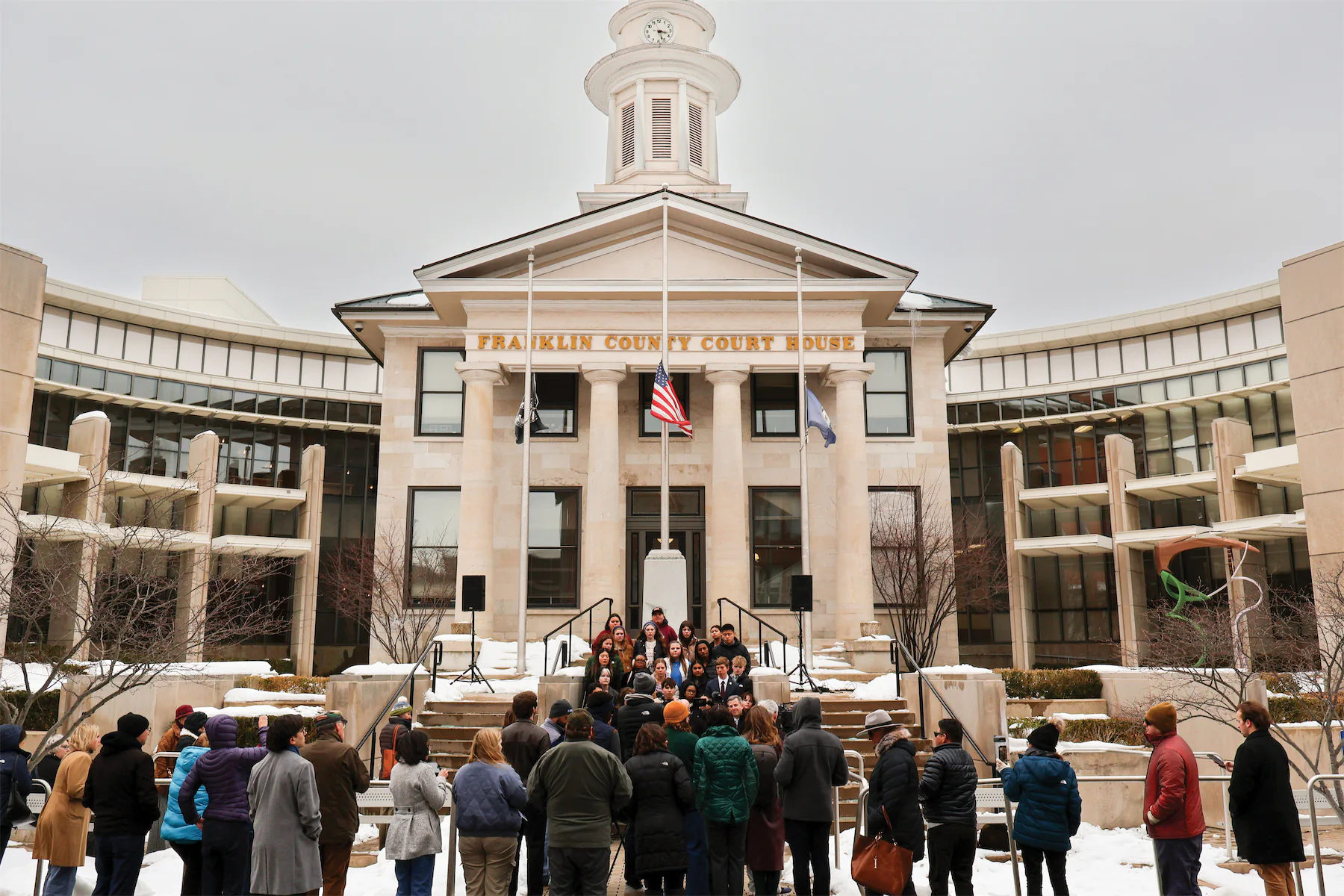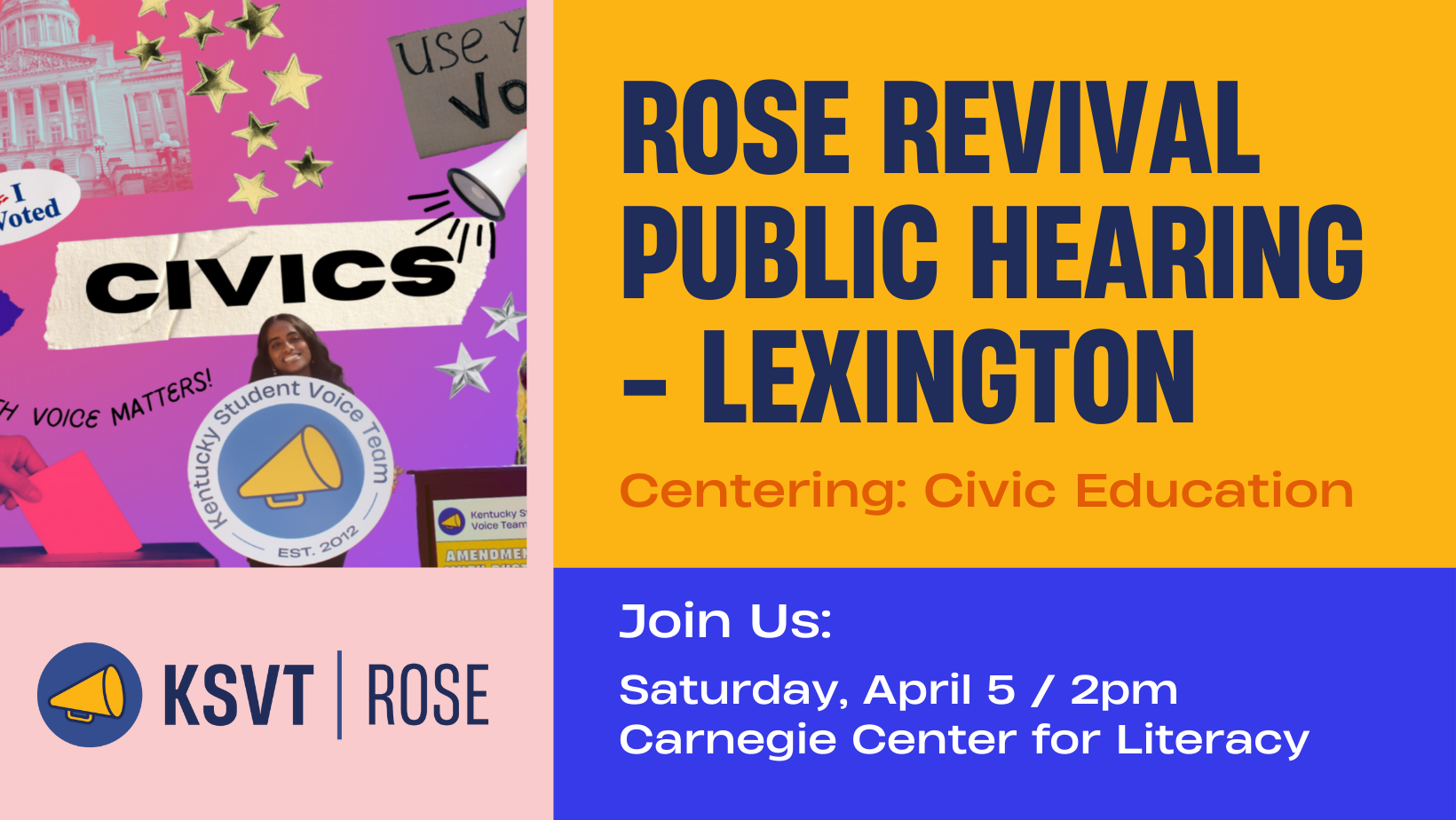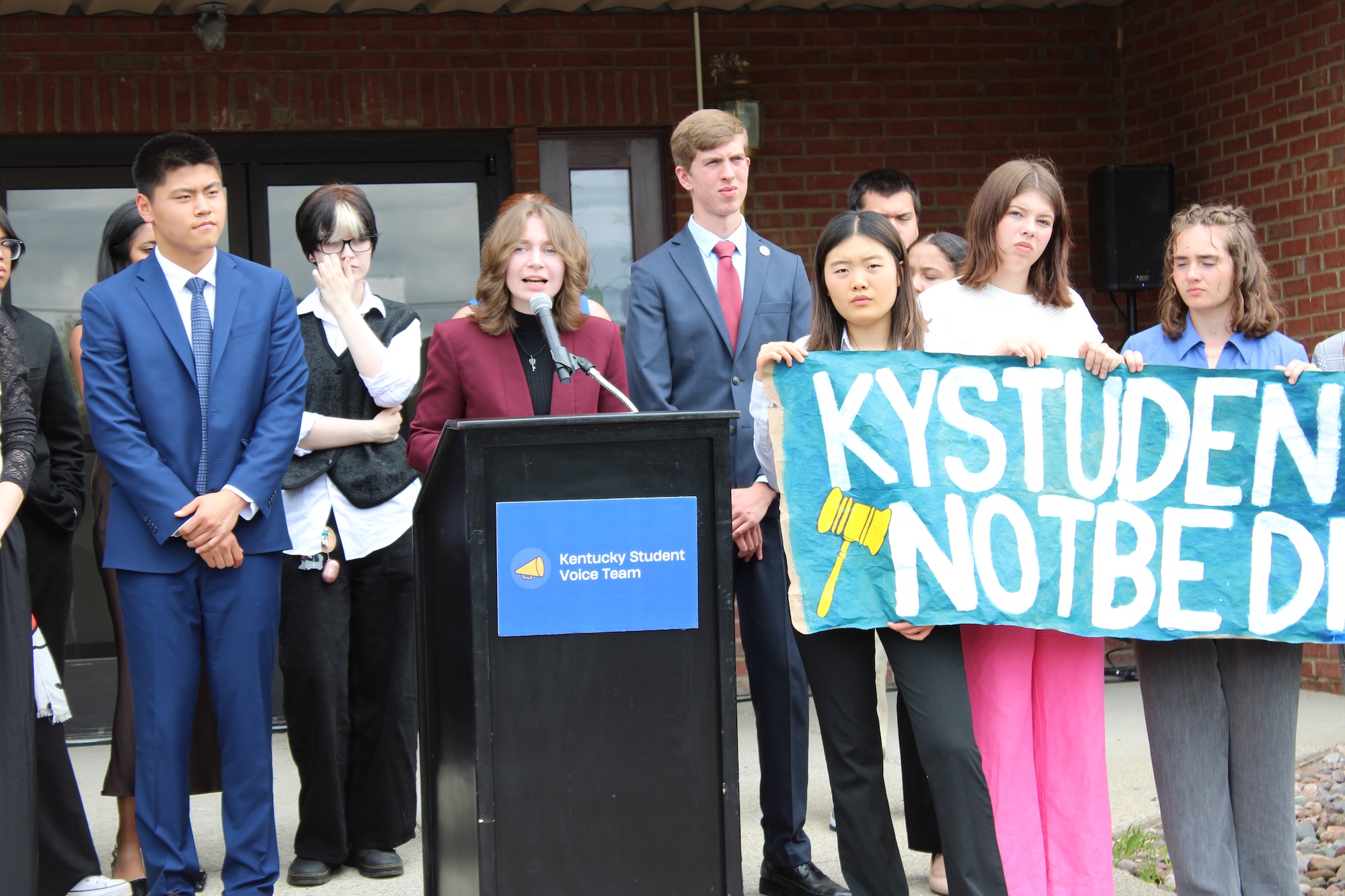Rose Revival Campaign
The legacy of the 1989 Rose vs. Council for Better Education case that promised an adequate public education has wilted, and we're suing the state to revive it. Join us in supporting this landmark KSVT vs. Commonwealth of Kentucky lawsuit.

Background & History
Rose v. Council for Better Education: A Landmark Decision
In 1989, the Kentucky Supreme Court issued a landmark decision in Rose v. Council for Better Education that electrified the Commonwealth—and the nation—and led to sweeping educational reforms even beyond Kentucky. The Court determined that Kentucky’s entire education system was unconstitutional, and it required the Commonwealth to design an entirely new system that would provide all students with an “adequate” and “equitable” education. The Court specifically defined “adequacy” to mean an education system that provides “each and every child” with seven “capacities”.
Attend
Upcoming Events
Check out upcoming events and get details on location, time and more.
Rose Today
Three decades have gone by since the landmark Rose v. Council for Better Education decision in 1989. The subsequent educational reform, backed by the vision of the Rose case, promised an adequate and equitable education for every student in Kentucky.
However, data collected over the past 30 years suggests that while there have been strides forward, gaps still exist, necessitating a revisit of the Rose mandate. Here's why:
Funding Disparities
Funding for education in Kentucky has seen significant disparities over the years. While KERA sought to equalize funding, recent data suggests that per-pupil spending in the state's poorest districts still lags behind the more affluent ones at levels equal to when Rose was decided. According to this research, over the past 15 years, funding for education has become increasingly inadequate with local contributions to SEEK funding overtaking State contributions.
Eroding Civic Engagement
A major cornerstone of the Rose capacities was to ensure students possess "sufficient understanding of governmental processes" and are equipped to engage civically. However, Kentucky is one of eleven states that does not require at least a semester of civic courses in high school. The lack of comprehensive civic standards has hindered students in Kentucky. A report from the Center for Information & Research on Civic Learning and Engagement found that students in Kentucky engage in civic activities at a drastically lower rate than the national average.
Widening Educational Inequities
Despite reforms, achievement gaps persist. Data shows that students from disadvantaged backgrounds in Kentucky consistently underperform their more affluent counterparts. Graduation rates, college readiness scores, and other metrics all indicate disparities based on socioeconomic status, race, and geography, underscoring the need for a renewed focus on equity as championed by Rose.
In light of this data, it becomes evident that while Kentucky has made significant strides since the 1989 Rose decision, the vision of an adequate and equitable education for all students is still an unfulfilled promise. Revisiting and reviving the spirit and specifics of the Rose mandate now is not just timely but crucial to ensure every student in the state gets the education they rightfully deserve.

We Wrote a Book
Why Kentucky Students Are Suing the State
Click the button below to learn more about what we covered, why this is timely, and how to get access.

Continuing the Fight
The Rose Revival Campaign
Fast forward a little. Over 30 years later, the Kentucky Student Voice Team is leading a campaign dubbed Rose Revival that is inspired by the landmark state supreme court decision, Rose v. Council for Better Education (1989). After nearly two year's worth of engagement and community forums across the Commonwealth, we know that the legacy of Rose has wilted, and that students will be at the center of the next solution.
We believe urgent legal action is needed to address systemic deficiencies in Kentucky’s education system, which is why in January 2025 we filed a groundbreaking lawsuit against the Commonwealth of Kentucky, asserting that the state has failed to fulfill its constitutional obligation to provide all students with an adequate and equitable public education.
KSVT Vs. the commonwealth
On January 14, 2025, KSVT and students filed a legal complaint in the Franklin County Circuit Court alleging the Kentucky government has failed to meet their constitutional obligation as described in Rose to provide an adequate education for all students.
Public Hearing Series
Through our upcoming public hearings, students will examine education expert “witnesses” about the allegations surfaced in our legal complaint. The hearings will generate policy solutions and spur an affirmative vision for students’ constitutional right to an adequate and equitable education resulting from our lawsuit.
State of Schools Report
Surfacing stories and statistics, we will be releasing a report in coming weeks on the State of Civic Education in Kentucky using data collected from over 2,500 responses to the KSVT State of Schools survey and hours of audio recordings from Rose Revival community forums.

Breaking down the complaint
The Kentucky Student Voice Team, alongside 13 individual student plaintiffs, filed the KSVT vs. The Commonwealth of Kentucky lawsuit because we are both deeply aware that Kentucky students are not receiving an adequate or equitable education, which is our constitutional right. We are particularly concerned that our education system is not effectively preparing students for capable citizenship as adults.
The lawsuit asks the court to declare that our constitutional and statutory rights are being violated and to require that the Commonwealth fix our public school system to make it constitutional.
We are also asking the court to declare that an adequate and equitable education requires inclusion of parents, teachers and students in educational decision-making so that all important Kentucky stakeholders have an ongoing voice in improving their schools.
Frequently Asked Questions About KSVT v. Commonwealth of Kentucky
Why File The Legal Complaint Now?
Students are not receiving the quality of education they have the constitutional right to. Decades of bipartisan mismanagement by Frankfort politicians has led to under-equipped educators and underfunded schools; our students are paying the price. The funding gap between the wealthiest and poorest districts has grown to $3,902 per student—higher than the unconstitutional levels identified in the Rose decision. This kind of inequity is leading to systemic issues in our education system. Kentucky has the opportunity to become a national model for education reform in the 21st century. After Rose, Kentuckians came together to ensure the next generation of children went to good public schools; we must make that promise to the next generation.
Are You Blaming Educators for These Issues?
Every Kentuckian knows an educator who has changed their life; our educators are the backbone of our public schools and communities. We should pay them what they deserve, ensure they have safe classrooms, and equip them with the resources they need to provide every student with a quality education. Kentucky educators’ pay has fallen 14.2% in real terms since 2008 (41st in the nation), and the state has one of the highest rates of educator vacancies in the country. Educators are doing their best under impossible conditions, and this lawsuit is about giving them the support they need. This lawsuit is about a system that’s failed to provide the resources and policies necessary for schools to thrive. Teachers and principals are essential partners in fixing this system, not the ones responsible for its failures.
Is This Just About Funding?
Ultimately, we know students are not receiving the quality of education they have the right to, which is what this case seeks to remedy. This lawsuit highlights the need for systemic reforms like better civic education, career readiness programs, and equitable resource distribution. In 1990, the state funded 75% of education costs, but today it funds less than 50%. We want the state to step up and meet its obligations to our students. Think of funding as the backbone of the system. Without it, schools can’t pay educators competitively, offer advanced coursework, or ensure students in poorer districts get the same opportunities as their peers in wealthier areas. Funding is essential to systemic education reform, but it cannot be the only piece.
What Is This Case Asking For?
We want Kentucky to fulfill the constitutional promise of the Rose decision by ensuring every student has an education that provides them with critical thinking skills, civic knowledge, and career readiness. Too many students are being denied these opportunities because of systemic inequities. Achieving that vision of public schools means fair educator pay, modern facilities, and access to arts, technology, and mental health services for every child.
Will This Embolden Anti-Public School Advocates?
The defeat of Amendment Two showed us that Kentuckians are demanding a doubling down on our commitment to public schools. This lawsuit is about going on the offensive for public schools by addressing the systemic failures that make them vulnerable to criticism. When schools are underfunded and inequitable, it’s easier for critics to argue that they don’t work. We are fighting against those who have sought to undermine educators and public schools by demanding a historic reinvestment in our education system.
How Can I Get Involved in This Work?
Attend one of the public hearings we’re hosting as part of the Rose Revival Campaign. These events are a chance to learn more, share your voice, and help shape the solutions we’re advocating for. Sign up for our email newsletter and donate to the public engagement campaign fund on ksvt.org.
Where We’ve Been
Community Engagement
Through a vigorous, ground-up public engagement campaign, we affirmed that the vision of Rose still resonates with Kentuckians, even decades later. Kentuckians believe that we can overcome the erosion of democratic norms and values and nurture more inclusive, successful, and vibrant communities. Summarized memos from each event are linked below.


Louisville Community Forum





Rose Revival Public Hearing - Lexington
Join us for the first of our series exploring why Kentucky lags behind in civic education and what can be done to ensure students graduate prepared for active citizenship. Students, educators, and community members will hear from expert witnesses on the challenges and solutions for improving civics education. KSVT student examiners will lead questioning, and attendees will have opportunities to participate in a Q&A.

Motion to Dismiss Court Hearing
The hearing is focused on the Commonwealth’s motion to dismiss the student-led lawsuit, which challenges the state’s systemic failure to meet its constitutional obligation to provide all Kentucky students with an adequate and equitable education.

Rose Revival Public Hearing - Louisville
This event will spotlight the urgent crisis in student mental health and focus on concrete solutions to ensure young people are supported, safe, and able to thrive in school and beyond. Students, educators, and community members will hear from expert witnesses on the challenges and solutions for improving mental health and wellness education. KSVT student examiners will lead questioning, and attendees will have opportunities to participate in a Q&A.

Rose Revival Public Hearing - Morehead
Join us for the third Rose Revival Hearing in Morehead! This event will spotlight the urgent crisis in Kentucky’s teacher shortage and focus on concrete solutions to ensure every student has access to qualified, supported and inspiring educators. Students, educators, parents and community members will hear from teachers and teacher advocates on the challenges and solutions for strengthening the teacher pipeline and improving teacher wellness. KSVT students will lead questions with attendees participate in an optional Q&A.

Motion to Dismiss Denied Press Conference
Judge Philip Shepherd denied the defendants’ motions to dismiss our litigation and affirmed that students unequivocally have standing to bring this litigation to trial. This is a resounding victory for Kentucky students, but it also marks the first step in a long judicial process.
.png)
Rose Revival Public Hearing - Danville
Join us for the fourth Rose Revival Hearing in Danville! This event will spotlight the need to strengthen arts education in Kentucky and focus on concrete solutions to ensure every student has access to rich, high-quality creative learning opportunities. Students, educators and community members will hear from expert witnesses on the challenges and solutions for expanding and sustaining arts programs in our public schools. KSVT student examiners will lead questioning, and attendees will have opportunities to participate in a Q&A.

